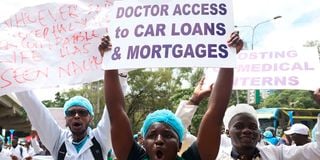Adopt healthier approach on public doctors’ strike

Striking doctors in a procession along Uhuru Highway in Nairobi on April 9, 2024.
As Kenya endures a gruelling strike by public hospital doctors that is almost two months old, the plight of the nation’s healthcare system has reached a critical point. The crisis not only jeopardises the health of countless Kenyans but also underscores the dire need for compassionate and effective leadership in the government.
Records show major hospitals like Kenyatta University Teaching and Referral Hospital would, every day, see up to 500 patients for radiotherapy and 410 for chemotherapy. This is just a glimpse of how Kenyans are suffering as the government continues to maintain hardlines that are costing lives.
Amidst the chaos and suffering, urgent action is imperative to address the pressing issues, particularly the payment of doctor interns.
The Kenya Medical Practitioners, Pharmacists and Dentists Union (KMPDU) has refused to accept the government’s proposal and thus sign the promissory Return To Work Formula (RTWF), claiming it has no timelines and accountability lines. That highlights the intention of doctors to arrive at a sustainable solution for this perennial problem.
True, signing an RTWF that has no timelines equates to managing symptoms of a disease that can be cured. This has continuously left doctors disheartened and healthcare services in disarray.
Glimmer of hope
On Monday, the Employment and Labour Relations Court directed both parties to resume negotiations without threats and to establish clear timelines through a RTWF within 48 hours, meaning before the end of today. That provides a glimmer of hope amidst the turmoil.
The Health ministry and the “Whole government approach” team should now avoid trivialising the issue and stick to the government’s commitment to advancing healthcare. They should go beyond rhetoric to take tangible actions that prioritise the well-being of medical professionals and patients.
The disconnect between the government’s promises and the reality on the ground is deeply troubling. Despite its pledge to invest in healthcare and uphold the constitutional right to the highest attainable standard of health as enshrined in Article 43, the prolonged strike highlights a systemic failure to fulfil these commitments.
The government’s insistence on a ‘whole government approach’ brings to mind the African saying “Too many cooks spoil the broth”. Instead of cohesive action, we’re witnessing a cacophony of disjointed voices across the government, further entangling a resolution process marked by political theatrics.
At its core, this crisis is a moral imperative that demands swift and decisive action. Paying the interns their overdue salaries is not merely a matter of financial compensation but recognition of their invaluable contribution to society. It is a reaffirmation of the government’s duty of prioritising the well-being of the citizens and uphold the principles of dignity and integrity in governance.
The government must now demonstrate leadership guided by conscience and empathy. Kenyans deserve better. They deserve a healthcare system that is resilient, responsive and rooted in compassion. The time for action is now.
Mr Natse is a project officer at the Centre for the Study of Adolescence. [email protected]. @DollarmanKE





